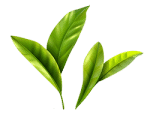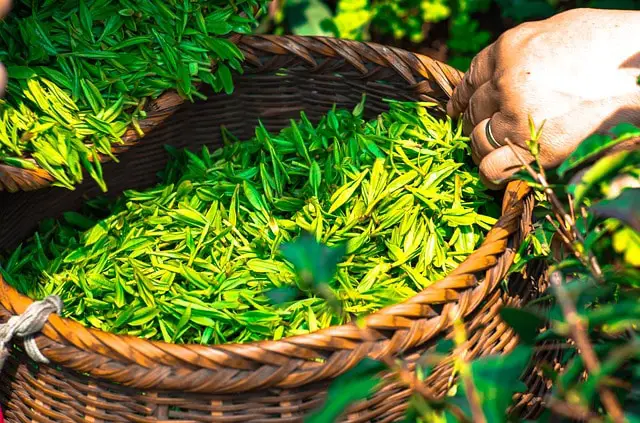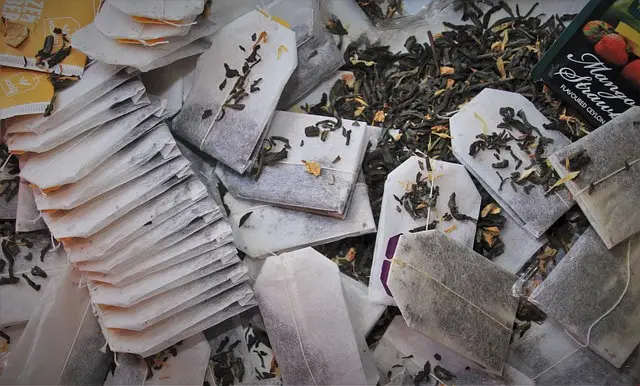
The answer to “can you eat tea leaves” is a yes! However, adding tea leaves to your dishes isn’t as straightforward as you might think.
As a dietician and tea lover, I have explored all the different ways that you can add tea to your diet. This includes actually eating tea leaves.
In this post, I show why it is safe to eat tea leaves, what to expect from the experience, and how to add tea leaves to your diet. Let’s begin!
Contents
The first thing that you should know is that tea leaves are edible.
As such, if you do want to eat them, you can. In fact, there are certain cultures that actually include tea leaves in their cuisine.
Thus, this isn't a new practice by any stretch of the imagination.
So, if this is the case, why don’t people eat tea leaves regularly?
Well, this would be because of the taste. By themselves, tea leaves don’t taste too good at all.
Depending on how processed they are, they may taste green and leafy or quite bitter.
Cuisines that do use tea leaves will often cook them or ferment them to add some much needed flavor to these leaves.
It is unusual to find the leaves being consumed without these additions.
You should also keep in mind that matcha tea is essentially ground up tea leaves that forms a powder.
When you make a matcha-based drink, you are simply whisking the ground leaves into hot water and consuming all of it.
So, what if you simply would like to chew the tea leaves? Is it possible for you to do this?
People have been chewing tea leaves for generations. This is no doubt due to the stimulating effects produced by the caffeine.
Due to this, it should be relatively safe to chew tea leaves.
If you do decide to this, try to chew a small amount of tea leaves – perhaps a teaspoon full or less.
This will limit the caffeine consumption.
At the same time, you shouldn’t make this a habit. Remember that there have been no studies conducted on chewing tea leaves.
As such, you can’t be certain that there aren't any side effects associated with it.
To remain on the safe side, only chew tea leaves when you need an energy boost.
So, is it better to eat the tea leaves than to steep them in water?
Not, really. The science proves that it is far better to steep your tea leaves in hot water for a short period of time.
This ensures that a greater number of nutrients are extracted from the tea leaves.
Understand, catechins – antioxidants – in tea leaves are water soluble.
Thus, when they are left in water, the substances move from the leaves to the water. This process doesn’t take place as well when you are simply chewing or ingesting the leaves.
Nevertheless, the caffeine content in tea leaves is quite high.
As such, consuming the tea leaves could potentially release more caffeine, making you more alert than simply drinking a cup of tea.

The thing to keep in mind, here, is that there is such a thing as too much caffeine.
Most experts would advise you to consume less than 400mg of caffeine each day.
Now, the average cup of tea (made with around 2gms or 2 teaspoons of tea leaves), can have between 47mg and 90mg of caffeine.
Thus, you have to drink between 4 and 8 cups of tea to reach your limit. This is easy enough to consciously adhere to.
When you are eating tea leaves, however, there is no way to know how much caffeine you are consuming.
Therefore, it is possible for you to go over you recommended amount.
Even if you don’t, consuming more caffeine than you are used to can cause an excess of energy, increased heart rate, and changes to your sleep patterns.
It should also be noted that just because tea leaves are edible doesn’t mean that they are easily digestible.
You may find that tea leaves can be difficult to digest and may make you feel unwell.
It has been established that it is safe for you to eat tea leaves. Does the same thing ring true for tea bags?
Absolutely not! Most tea bags are made from paper, plastic, or silk. These bags may also be held together by cotton or metal staples.
All in all, it is not safe for you to eat tea bags.
However, you could potentially open the tea bag, discard the lining, and consume the tea leaves that are found inside.

Related Articles
Composting Tea Bags: Can You Discard Them the Natural Way?
If you want to eat tea leaves, then you need to be a bit more careful about the kind of tea leaves that you are purchasing.
This is because there are many brands that do have some form of contamination. These may be pollutants, microorganisms, heavy metals, and other substances.
Now, when the tea is allowed to steep in hot water, the rate of transmission from the leaves to the brew is quite low, almost negligible.
Nevertheless, it is difficult to ascertain how many of these contaminants may be transferred to you if you eat the leaves.
Due to this, you may want to only buy organic tea leaves. These are grown with far more precautions and are often tested more stringently as well.
As such, they are less likely to contain contaminants or harmful ingredients.
Related Articles
Let the Initiation Begin! All You Need to Know About Tea for Beginners
All You Can Chew On: Is Tea Leaf Salad Healthy?
So, this is your answer to whether or not you can eat tea leaves. As you can see, there is more to it than meets the eye.
